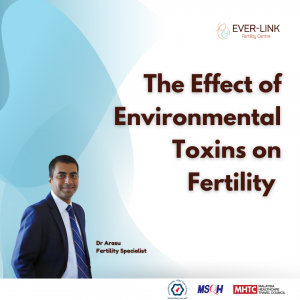
Environmental toxins are all around us found in the air we breathe, the food we eat, and the products we use. These toxins, such as heavy metals, pesticides, and endocrine-disrupting chemicals, can have a signific impact on reproductive health. In this article, we explore how an environmental toxins affect fertility and what steps you can take to reduce exposure.
- Toxins and Female Fertility
Environmental toxins have been shown to disrupt hormonal function, which is crucial for female fertility. A study in Environmental Health Perspectives (2016) found that exposure to pesticides and plastics containing bisphenol A (BPA) is associated with irregular menstrual cycles and difficulty conceiving. These chemicals act as endocrine disruptors, meaning they interfere with hormone signaling, which can affect ovulation and egg quality. Long-term exposure to environmental toxins can also increase the risk of conditions like polycystic ovary syndrome (PCOS) and endometriosis, both of which can reduce fertility. Reducing exposure to these harmful substances can improve reproductive health by supporting a balanced hormonal system.
- Toxins and Male Fertility
Environmental toxins don’t just affect women men are also at risk. A study in Fertility and Sterility (2017) showed that men who were exposed to high levels of environmental toxins, such as pesticides and industrial chemicals, had significantly lower sperm count, motility, and quality. These toxins can interfere with testosterone production, which is essential for sperm production. Endocrine disrupting chemicals like BPA, commonly found in plastic containers and food packaging, have been linked to reduced sperm quality. Men who are exposed to these chemicals may experience a decline in fertility over time, making it harder to conceive.
How to Reduce Exposure to Toxins
There are steps that both men and women can take to reduce exposure to environmental toxins. These include choosing organic foods to reduce pesticide intake, avoiding plastic containers and bottles, and using nontoxic household products. Reducing exposure to pollutants by avoiding areas with high levels of air pollution and using air purifiers at home can also be beneficial.
Conclusion
Environmental toxins can significantly impact fertility in both men and women, leading to hormonal disruptions, reduced sperm quality, and challenges in conception. Reducing exposure to these harmful chemicals through lifestyle changes and environmental awareness is key to preserving reproductive health. By taking proactive steps to minimize toxin exposure, individuals can improve their chances of conceiving.

